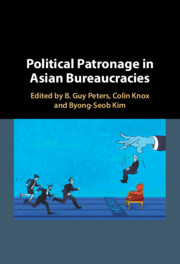‘Building on work in Latin America, the authors explain styles of patronage in Asia considering social homogeneity, party systems, political culture, regime type, and the strength of the civil service. The book is essential reading for all comparativists, and those seeking to understand the behavior of key Asian polities.'
John P. Burns - Emeritus Professor, Department of Politics and Public Administration, The University of Hong Kong
‘This volume is a major contribution to the study of the politic of patronage in Asia. It distinguishes patronage from politicisation and clientelism. It analyses why governments in the region resource to patronage in different political contexts. It outlines different types of patronage roles and account for its varieties. The case studies are rigorously presented and relate modalities of patronage to the region's political systems. While the focus is on Asia the typology of patronage roles outlined in the book is a useful analytical tool for the study of patronage across countries and regions. A must for both scholars of politics and of public administration.'
Francisco Panizza - Professor in Latin American and Comparative Politics, The London School of Economics and Political Science
‘This book presents rich and thick descriptions of patronage patterns in eleven Asian countries based upon a 2×3 typology created by B. Guy Peters, and attempts to explain the types of patronage from comparative perspectives with Latin American and Western countries. The volume fills a gap in the literature on political patronage and public bureaucracy in Asia and will be an useful aid for students and scholars interested in comparative public administration.'
Keun Namkoong - Distinguished Professor Emeritus, Former President of Seoul Tech and of Korean Association for Public Administration
‘This collective volume is a formidable effort to systematically map and document patronage appointments in public bureaucracies of Asian countries. Drawing on a carefully defined analytical framework previously developed for the study of Latin American bureaucracies, the authors draw on a wide range of primary and secondary data to explore the motivations why political patrons make appointments, what roles patronage appointees play, and the reasons for these forms of patronage to emerge. Comparative lessons are drawn from exploring patronage patterns in a range of multi-party democracies, but also in one-party dominant and autocratic political systems.'
Petr Kopecky - Professor of Comparative Studies Political Parties and Party Systems, Leiden University



